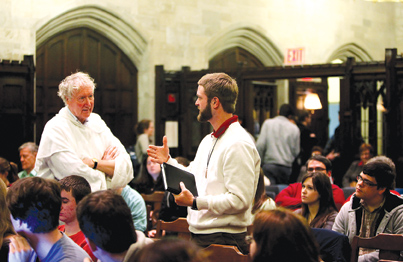At the heart of the Christian story is a stirring drama about personal fortitude, genuine love, and the triumph of good over evil.

Photo by Bruce Gilbert
But if asked, would Christians actually describe their religion in that way?
Too often, the drama beneath Christianity’s surface lies dormant under rules, semantics, and other technical aspects of the tradition. Awakening Christians to the beauty of their faith is not a challenge for the intellect, but for the imagination, said Timothy Radcliffe, O.P., former Master of the Dominican Order.
Father Radcliffe, a major figure in global Christianity who has spoken extensively on reconciling divisions within Catholicism and bringing the tradition into dialogue with the world, drew a standing-room-only crowd to campus on Feb. 12 for “How Can Christianity Touch the Imagination of Our Contemporaries?”
“Most religion is boring, because it’s abstract. It’s remote,” Father Radcliffe said. “We long for the intimacy, the closeness of God.”
In order to tune others into this vital religious tradition, Christians must appeal to the imagination. To illustrate the point, he discussed the 2010 film Of Gods and Men, which depicts the true story of a community of Trappist monks caught up in a civil war. The monks had been living peacefully in a small, predominantly Muslim village in Algeria when they had to choose between fleeing for their lives and remaining to help the villagers. Ultimately, their decision to stay leads to their kidnap and murder.
The movie helps to open up the drama of Christianity, Father Radcliffe said, because it touches upon the genuine experiences of Christians. To the rest of the world, the monks would seem to be anonymous individuals. Yet they remain true to their identities as monks and devoted to their common purpose.
“Why is our society attracted by prefabricated identities? I think it is because we fear we won’t be loved as who we are,” he said. “Virtue is the hard labor of becoming the person God created you to be.”
Second, the movie speaks to an uncertain world.
“We can identify with these monks precisely because they were fumbling, searching, trying to find their way forward. I think we’ve all been there—we’ve all been through those moments of hesitancy, of doubt… And each of us has to arrive at authentic faith at our own pace.”
Finally, the movie affirms the triumph of good over evil by highlighting Jesus’ fundamental ethic of nonviolence.
“Every society needs its story of the victory of goodness, otherwise our sufferings have no meaning and we might as well give up,” Father Radcliffe said. “It shows a love and gentleness that cannot be defeated, a goodness that no violence is ever going to slay. I think that touches our imagination.”
The best way to awaken the Christian imagination is to take to heart Jesus’ commitment to forgiveness and nonviolence, despite the cruelty he endured. In order to do that, Christians must be willing to engage creative people who can open up that story in new, unique ways.
“We will never touch the imagination of our contemporaries if we try to market Christianity as just a set of nice moral values,” he said. “Christian doctrines only have meaning in that drama of life and death, the story of the monks, the story of Jesus Christ.”
Co-sponsors included the Graduate School of Religion and Religious Education, the theology department, and the Curran Center for American Catholic Studies.
